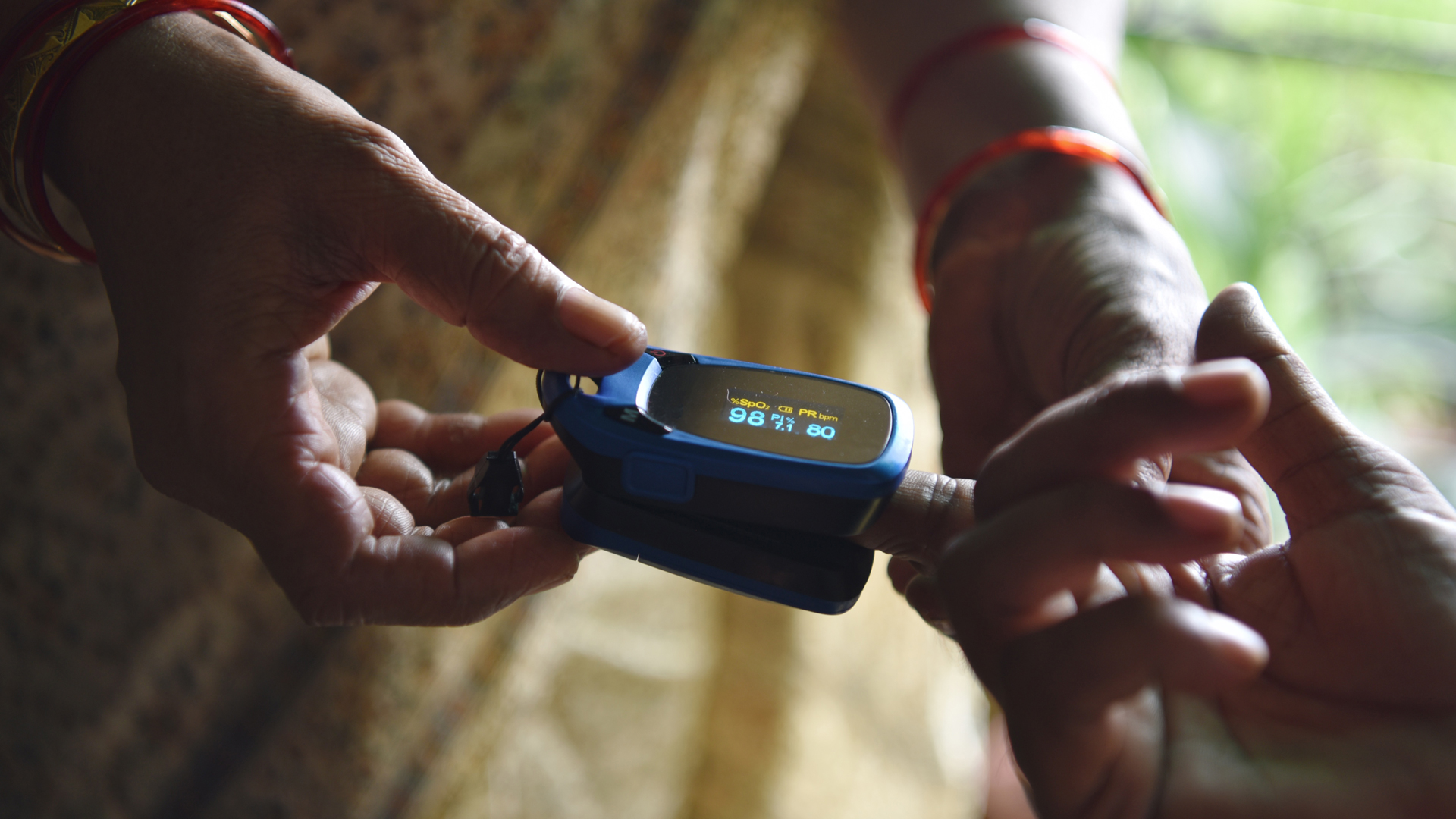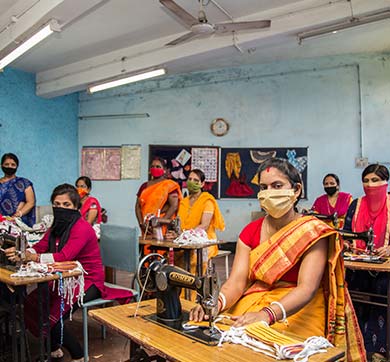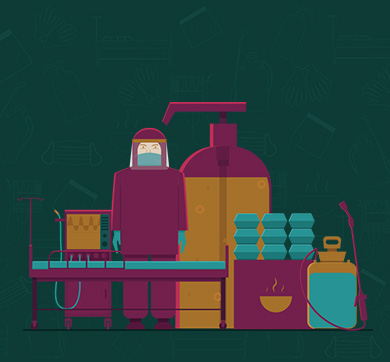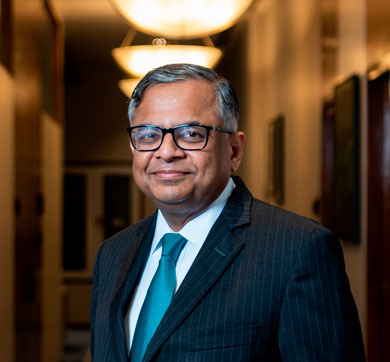July 2020 | 1288 words | 5-minute read
Fast, accurate and accessible testing can transform the way we are dealing with tracking and halting the spread of Covid-19. And Tata Sons has deployed the investigative skills of a homegrown Feluda, much like the fictional Bengali sleuth it is named after, to help India solve the mystery of this pandemic.
Feluda — an acronym for FNCAS9 Editor-Limited Uniform Detection Assay — is an indigenous Covid-19 testing mechanism that was created at the Council of Scientific and Industrial Research’s constituent lab, the Institute of Genomics and Integrative Biology (CSIR-IGIB) in New Delhi. It is expected to address the urgent need for accurate mass testing because of its affordability, relative ease of use and non-dependency on expensive qPCR (quantitative polymerase chain reaction) machines.
Satyajit Ray — the creator of the original Feluda, a genius-but-everyday hero — would have approved.
For the masses
Feluda is being brought out of the lab and made available for wide use by Tata Sons, which has signed an MoU with CSIRIGIB in May to licence the know-how.
“This innovative ‘Feluda’ test uses cutting-edge CRISPR (Clustered Regularly Interspaced Short Palindromic Repeats) technology for detection of genomic sequence of the novel coronavirus. It uses a test protocol that is simple to administer and easy to interpret, enabling results to be made available to the medical fraternity in relatively lesser time as compared to other test protocols,” says Banmali Agrawala, president, Infrastructure and Defence and Aerospace, Tata Sons. “We believe that CRISPR is futuristic technology that can also be configured for detection of multiple other pathogens in the future.”
How it works
According to Dr Anurag Agrawal, Director, IGIB, the technology was conceived and developed under a sickle cell mission and utilises an indigenously developed cutting-edge CRISPR-Cas9 technology to specifically recognise Covid-19 sequence in a sample. A combination of CRISPR biology and paper-strip chemistry leads to a visible signal readout on a paper strip that can be rapidly assessed for establishing the presence of the viral infection in a sample.
The MoU with Tata Sons allows for scaling up this knowhow in the form of a kit that can be deployed for testing on ground.
Tata Sons has also tied up with the Sree Chitra Tirunal Institute for Medical Sciences and Technology in Trivandrum, under the Department of Science and Technology (DST), for the commercial production of Covid-19 testing kits based on RT-LAMP (Reverse Transcriptase Loop-Mediated Amplification) technology, which can produce quicker results thereby increasing the throughput of labs in India. The ‘Chitra Gene LAMP-N’ test uses an isothermal setup to create copies of viral DNA for detection, which significantly reduces the complexity of overall process compared to the prevalent Real Time PCR technology.
“Testing is a crucial part of this fight against Covid-19 as early detection and treatment arrests the spread of the infection,” says Mr Agrawala. “Our association with the Sree Chitra Tirunal Institute is a significant step in our efforts to encourage indigenous production of second-generation testing kits, which enhances speed of testing and ease of handling.”
Professor Ashutosh Sharma, Secretary, DST, adds, “Development of a novel, inexpensive, faster, confirmatory test for the diagnosis of Covid-19 by Sree Chitra in a record time is a compelling example of how a creative team of scientists, clinicians and industry working together seamlessly can leverage knowledge and infrastructure to make relevant breakthroughs.”
Race for a cure
The Tata group has also channelled its own scientific temper towards finding a cure for Covid-19. A team of scientists at the Tata Consultancy Services (TCS) Innovation Lab in Hyderabad have identified 31 molecular compounds that hold promise towards finding a cure.
“In TCS, there was a strong feeling within the Research and Innovation leadership that we should use our expertise and work on various aspects of Covid-19 at this crucial moment. The clear guidance was to do something that would be of benefit to society and make it public,” says a scientist from TCS’ Innovation Lab. “Since the computational structural biology team at TCS Innovation Labs has expertise in medicinal chemistry, they started looking at the problem of identification of novel small molecules for Covid-19.”
They utilised their AI-based generative models for designing novel small molecules to inhibit the 3CL protease protein (the main protease of SARS-CoV-2). The 3CL protease plays an essential role in cleaving long polyproteins generated by the virus into various functional proteins, which is necessary for it to replicate in the human body. An inhibitor against the 3CL protease will make the virus inactive.
Putting it into perspective, says the scientist, “Drug discovery is a very long and complex process. The use of AI has reduced the initial drug development process from years to few days. With a pretrained AI model with state-ofthe-art accuracy for molecule generation and property optimisation, the actual work was done within seven days.”
The results of the analysis were immediately published in ChemRxiv, an open access preprint archive for chemistry.
TCS also approached CSIR, which has agreed to synthesise and test these 31 molecules. K Ananth Krishnan, executive vice president and chief technology officer, TCS, says, “The collaboration between TCS and CSIR is a standing example of public private partnership in tackling a problem of national importance. But de-novo drug candidate design is the first step in a long sequence of steps to find a cure to Covid-19.”
Much remains to be done before the process can move from drug design to drug discovery and finally drug development at scale. CSIR has the challenging job of testing the molecules in the lab and then in humans, all of which takes time.
Powering the fight at scale
Tata Consultancy Services (TCS)
The company led initiatives like systems to collate effectiveness data in collaboration with pharma and medical institutions, radiology image analysis using AI models to differentiate between Covid-19 infections and other pathologies and a wearable monitor for quarantine patients and healthcare professionals.
Through its social innovation centre, DiSQ (Digital Impact Square), TCS leveraged technology to fight Covid-19 at scale. It collaborated on the MahaKavach app to help health authorities in Maharashtra with contact tracing and monitoring of quarantined Covid-19 patients and worked on a tool to enable citizens to assess symptoms from their homes. The latter was used for 3.5 lakh+ assessments in Maharashtra by the end of May.
TCS also powered a vehicle e-pass system, which was deployed in 30 districts in Maharashtra, to allow essential and authorised services to move and work smoothly during the lockdown.
Tata Communications
Their tele medicine platform GloHeal supported video conferencing for Tata group volunteers to help people schedule remote consultations with doctors in Uttar Pradesh, Andhra Pradesh and Maharashtra.
Ray of hope
While the world awaits a big drug discovery anxiously, the scientists at TCS, much like their counterparts outside, believe there are many aspects about the search for a cure for Covid-19 that should give people hope.
Relaying the reasons for their optimism, TCS says, “First, the effort is global. Many governments and leading pharma companies are frantically working on the problem.
“Second, multiple approaches are being tried: repurposing existing drugs, antivirals for treatment, and making a vaccine.
“Third, scientists have been able to isolate the virus and study it very early in the outbreak.
“Fourth, we have tools with AI that reduce the time for synthesising drugs. New drugs usually take many years to develop and hit the market. TCS researchers feel it will not take that long for the Covid-19 cure.
“The relentless efforts of several research institutions and pharma companies in collaboration to identify a vaccine/therapeutic for Covid-19 are getting intense by the minute. TCS scientists have made a small contribution to the global efforts to find a cure. Hopefully, one of their molecules will make it to the clinic in the nearest future.”
—Monali Sarkar








